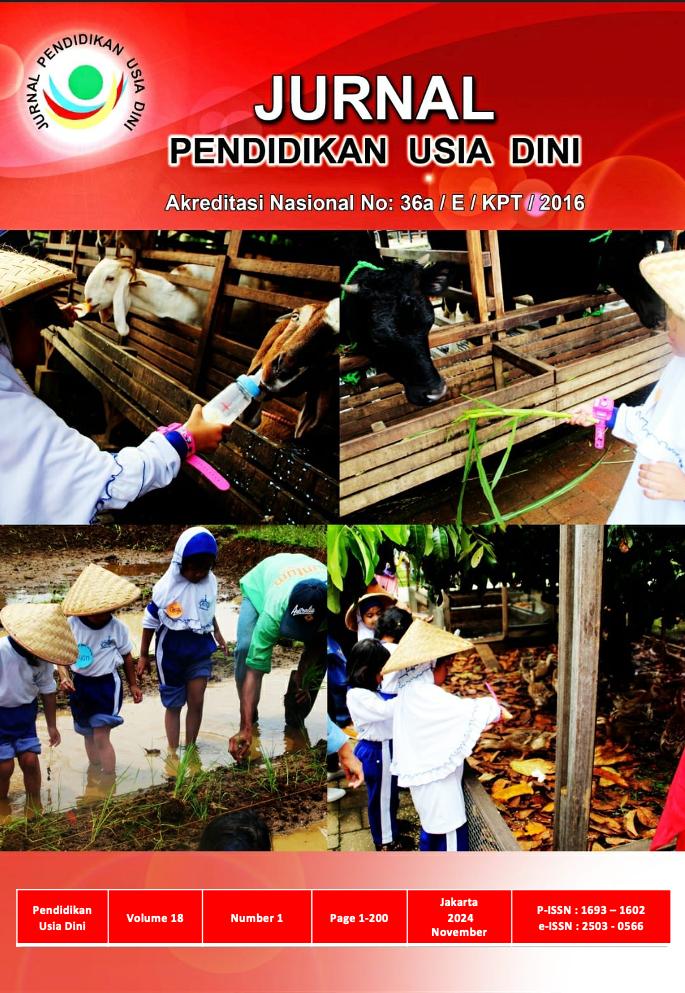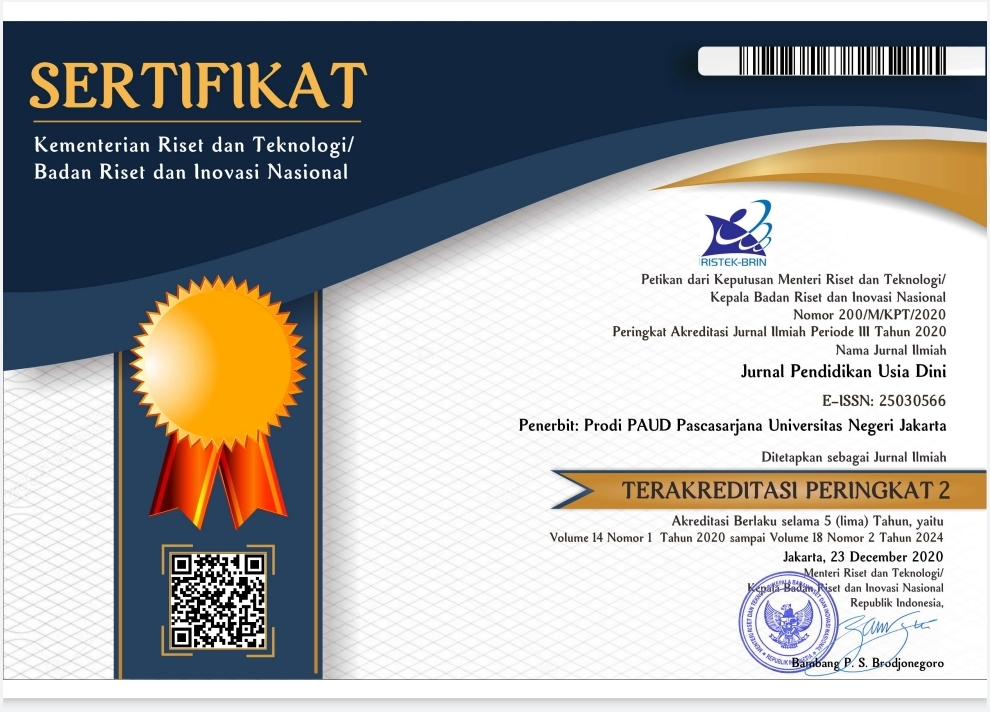The Effectiveness of Online Learning as A Form of Critical Pedagogic Transformation: The Perceptions of ECCE Teachers and Parents
DOI:
https://doi.org/10.21009/JPUD.181.01Abstract
ABSTRACT: Regarding their competence, teachers must be able to improve their professional competence by utilizing technology and communication (ICT) by the demands of 21st-century competence. Furthermore, the nation's problems in the field of education and professionalism include several main problems that require more applicable and quality training for teachers and parents. This research aims to measure the perceptions of ECCE parents and teachers regarding the digital competence (use of technological devices and ability to access the internet) of online learning that they carry out, whether the learning is effective and able to measure children's competence or competence still needs to be improved to make it even better. The method that will be used in this research is quantitative research with a survey method in the form of a questionnaire. Participants are focused on ECCE teachers and parents who have early childhood children, especially kindergartens and elementary school grades 1 and 2 (aged 4 to 8 years). The results of the data analysis, of this research show that both parents and teachers feel face-to-face learning is more effective than online learning. This condition is supported by data that both parents and teachers feel obstacles and doubts that online learning can measure children's competence.
Keywords: professional development, digital learning, digital competencies, technology in learning
References:
Abbas, H. (2015). Straightening the Direction of Education. PT PP Mardi Mulyo.
Abbas, H. (2020). Contemporary Issues on Indonesian Education: Expedient Truths. PT PP Mardi Mulyo.
Abdallah, A. K. (2018). Parents Perception of E-Learning in Abu Dhabi Schools in United Arab Emirates. International Journal of Advances in Social Sciences, 4(10). http://ijasos.ocerintjournals.org/en/download/article-file/458240
Advocates, E. (2015). Every Student Succeeds Act: Comparison of the No Child Left Behind Act to the Every Student Succeeds Act. www.acsd.org
Ala-Mutka, K. (2011). Mapping digital competence: towards a conceptual understanding. Institute for Prospective Technological Studies.
Alhumaid, K., Ali, S., Waheed, A., Zahid, E., & Habes, M. (2020). COVID-19 & Elearning: Perceptions &Attitudes Of Teachers Towards E-Learning Acceptance in The Developing Countries. Multicultural Education, 6(2). https://doi.org/10.5281/zenodo.4060121
Alkaabi, S. A. R., Alkaabi, W., &; Vyver, G. (2017). Researching Student Motivation. Contemporary Issues in Education Research, 10(3). https://clutejournals.com/index.php/CIER/article/view/9985/10086
Anderson, T., & Dron, J. (2011). Three generations of distance education pedagogy. The International Review of Research in Open and Distributed Learning. 12(3).
Aparicio, M., Bacao, F., &; Oliveira, T. (2017). Grit in the path to e-learning success. Computers in Human Behavior, 66, 388–399. https://doi.org/10.1016/J.CHB.2016.10.009
Best, S. J., & Harrison, C. H. (2009). Internet Survey Methods. In L. Bickman & D. J. Rog (Eds.), The SAGE Handbook of Applied Social Research Methods (2nd ed.). SAGE Publications, Inc. https://books.google.co.id/books?hl=id&lr=&id=m4_MAwAAQBAJ&oi=fnd&pg=PA375&dq=fowler+2009+survey&ots=ZVUJUrEXyq&sig=ULNAWcDriqjKfOWg9FasuNS39ns&redir_esc=y#v=onepage&q&f=false
Billingham, K. A., & Billingham, K. A. (2019). Early Childhood Development. In Developmental Psychology for the Health Care Professions. https://doi.org/10.4324/9780429045141-3
Cheok, M. L., Wong, S. L., Ayub, A. F., &; Mahmud, R. (2017). Teachers' Perceptions of E-Learning in Malaysian Secondary Schools. Malaysian Online Journal of Educational Technology, 5(2). www.mojet.net
Cole, A. W., Anderson, C., Bunton, T., Cherney, M. R., Cronin Fisher, V., Draeger, Jr., R., Featherston, M., Motel, L., Nicolini, K. M., Peck, B., & Allen, M. (2017). Student Predisposition to Instructor Feedback and Perceptions of Teaching Presence Predict Motivation Toward Online Courses. Online Learning, 21(4). https://doi.org/10.24059/olj.v21i4.966
Cresswell, J. (2013). Qualitative, quantitative, and mixed methods approaches. In Research Design (Fifth). SAGE. https://edge.sagepub.com/creswellrd5e/student-resources-0
Cresswell, J. W., &; Cresswell, J. D. (2018). Research Design: Qualitative, Quantitative, and Mixed Methods Approaches (Fifth). SAGE Publications, Inc.
Creswell, J. W. (2016). Research Design: Qualitative, Quantitative, and Mixed Method Approaches (fourth). Student Library.
Crompton, H., Burke, D., Gregory, K. H., &; Gräbe, C. (2016). The Use of Mobile Learning in Science: A Systematic Review. Journal of Science Education and Technology 2016 25:2, 25(2), 149–160. https://doi.org/10.1007/S10956-015-9597-X
Daniels, M. M., Sarte, E., & Cruz, J. Dela. (2019). Students' perception of e-learning: a basis for the development of e-learning framework in higher education institutions Recent citations. The International Conference on Information Technology and Digital Applications. https://doi.org/10.1088/1757-899X/482/1/012008
Ferrari, A., Punie, Y., & Bre, B. N. (2013). DIGCOMP: A Framework for Developing and Understanding Digital Competence in Europe. https://doi.org/10.2788/52966
Ghomi, M., &; Redecker, C. (2019). Digital competence of educators (DigCompedu): Development and evaluation of a self-assessment instrument for teachers' digital competence. CSEDU 2019 - Proceedings of the 11th International Conference on Computer Supported Education, 1(Csedu), 541–548. https://doi.org/10.5220/0007679005410548
Hobbs, R., & Tuzel, S. (2017). Teacher motivations for digital and media literacy: An examination of Turkish educators. British Journal of Educational Technology. https://doi.org/10.1111/bjet.12326
Jiménez-Hernández, D., González-Calatayud, V., Torres-Soto, A., Mayoral, A. M., &; Morales, J. (2020). Digital competence of future secondary school teachers: Differences according to gender, age, and branch of knowledge. Sustainability (Switzerland), 12(22), 1–16. https://doi.org/10.3390/su12229473
Kontos, G. (2015). Practical teaching aids for online classes. Journal of Educational Technology Systems, 44(1), 36-52
Krumsvik, R. J. (2014). Teacher educators' digital competence. Scandinavian Journal of Educational Research, 58(3), 269–280. https://doi.org/10.1080/00313831.2012.726273
Lestiyanawati, R. (2020). The Strategies and Problems Faced by Indonesian Teachers in Conducting E-learning During COVID-19 Outbreak. CLLiENT (Culture et al.), 2(1). https://ojs.unsiq.ac.id/index.php/cllient/article/view/1271
Lin, M.-H., Chen, H., &; Liu, K. S. (2017). A study of the effects of digital learning on learning motivation and learning outcome. Eurasian Journal of Mathematics, Science and Technology Education, 13(7), 3553–3564.
Lubis, A. H., &; Lubis, Z. (2020). Parent's Perceptions on E-Learning During Covid-19 Pandemic in Indonesia. Journal of Critical Reviews, 7(18).
McGarr, O., & McDonagh, A. (2020). Exploring the digital competence of pre-service teachers on entry onto an initial teacher education program in Ireland. Irish Educational Studies, 40(1), 115–128. https://doi.org/10.1080/03323315.2020.1800501
McKnight, K., O'Malley, K., Ruzic, R., Horsley, M., Franey, J. J., & Bassett, K. (2016). Teaching in a digital age: How educators use technology to improve student learning. Journal of Research on Technology in Education. https://doi.org/10.1080/15391523.2016.1175856
Røkenes, F. M., &; Krumsvik, R. J. (2016). Prepared to teach ESL with ICT? A study of digital competence in Norwegian teacher education. Computers and Education, 97, 1–20. https://doi.org/10.1016/j.compedu.2016.02.014
Simonson, M., Zvacek, S. M., & Smaldino, S. (2019). Teaching and Learning at a Distance: Foundations of Distance Education 7th Edition. IAP.
Tudor, S., Stan, M., & Paisi-Lazarescu, M. (2015). Integration of e-learning in teaching/learning courses at preschool and primary pedagogical teachers. eLearning & Software for Education, 2, 340-345
Vitoria, L., Mislinawati, M., &; Nurmasyitah, N. (2018). Students' perceptions on the implementation of e-learning: Helpful or unhelpful? The 6th South East Asia Design Research International Conference (6th SEA-DR IC).https://doi.org/10.1088/1742-6596/1088/1/012058
Wasserman, E., &; Migdal, R. (2019). Professional development: Teachers' attitudes in online and traditional training courses. Online Learning Journal. https://doi.org/10.24059/olj.v23i1.1299
Downloads
Published
How to Cite
Issue
Section
License
JURNAL PENDIDIKAN USIA DINI work is licensed under a Creative Commons Attribution 4.0 International License. (http://creativecommons.org/licenses/by/4.0/)





